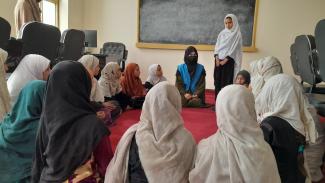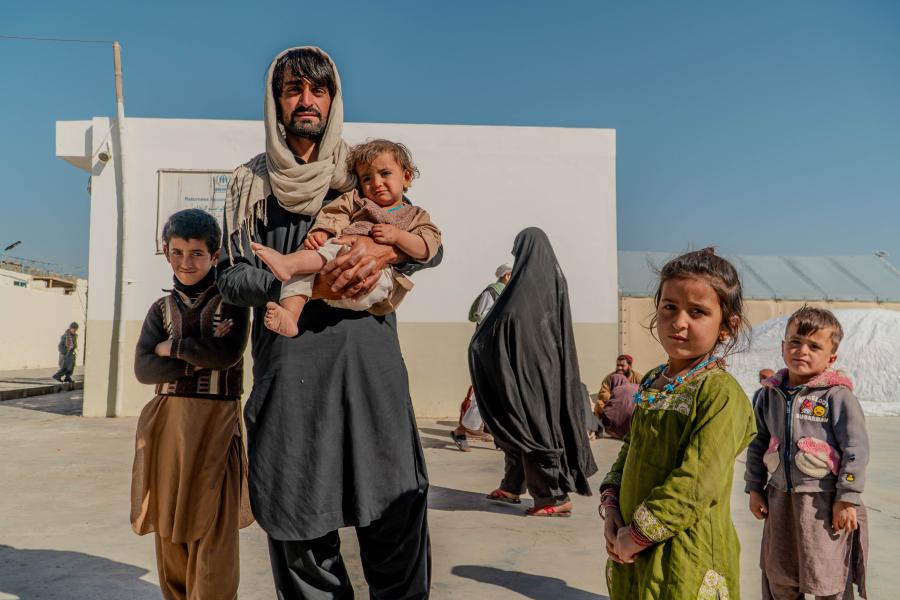2023 situation overview
In 2023, humanitarian needs in Afghanistan outpaced available funding. While the need for protection and solutions increased considerably, the space within which UNHCR operated continued to shrink. Discriminatory measures introduced by the de facto authorities throughout the year restricted the participation of Afghan women and girls in most areas of public and daily life and impacted the protection response. All this had a disproportionately negative impact on Afghan returnees, IDPs, refugees and asylum-seekers in Afghanistan and the communities that generously host them.
Against this dynamic backdrop, UNHCR reached all 34 provinces in Afghanistan and supported 1.5 million people, almost 80% of whom were women and children. Some 364,000 people were reached with cash assistance, around 260,000 benefited from in-kind assistance, as well as 530,000 from community-based interventions. UNHCR continued to deliver services and opportunities via an area- and solutions-based approach in the 80 Priority Areas of Return and Reintegration, with a particular focus on protection, basic needs, health, education and livelihoods, which sought to enhance the absorption capacity while also facilitating the sustainable reintegration of IDPs and returnees. Over 40,000 people received psychosocial support, 30,000 benefited from child protection activities, and at least 1,400 benefited from training in tailoring skills.
90% of Afghan refugees live in the Islamic Republics of Iran and Pakistan. In line with the Solutions Strategy for Afghan Refugees (SSAR) and the Global Compact on Refugees, UNHCR supported inclusive policies by channelling investments into national public service delivery systems and promoting collaborative policies and approaches via the SSAR Support Platform.
In Pakistan, UNHCR and other partners advocated for safe and voluntary returns and a screening mechanism to identify individuals in need of international protection after authorities introduced the “Illegal foreigners’ repatriation plan” in October, which saw over 500,000 Afghans return to Afghanistan between 15 September and the end of 2023, including 30,000 deportees.
In addition, over 690,000 undocumented Afghans were deported from the Islamic Republic of Iran. Despite the declining number of returns from Pakistan towards the end of the year, UNHCR and its partners continued to advocate for safe and voluntary returns and a screening mechanism to identify individuals in need of international protection.
In Central Asia and the Islamic Republics of Iran and Pakistan, UNHCR and partners implemented a community- and area-based approach via the inter-agency Regional Response Plan (RRP), led and coordinated by UNHCR.
In 2023, 65 RRP partners – up from 40 in 2022 – came together to bolster the response, working through government systems wherever possible, to deliver protection and assistance, promote better and more sustainable outcomes for refugees and the communities that host them, and advance advocacy and resource mobilization.
Despite a challenging funding landscape – 33% of the RRP was funded by year-end – several gains were made. In addition to providing direct support to host communities, considerable assistance was provided to the Islamic Republic of Iran to strengthen national systems that cater to refugees and nationals alike, particularly secondary health care. A new system to improve the management of refugee feedback to UNHCR was rolled out in Afghanistan and the Islamic Republic of Iran. Increased efforts were taken to protect children and prevent and mitigate the risks of gender-based violence through the roll-out of the Engaging Men in Accountable Practices programme in the Islamic Republic of Pakistan.
At the 2023 Global Refugee Forum, signatories of the ReSolve multi-stakeholder pledge reaffirmed the commitment to resilience and solutions for the Afghanistan situation. With a focus on enhancing access to education and skills development, livelihoods, economic inclusion and health services, along with resettlement and complementary pathways, UNHCR is facilitating the implementation of the situational pledges made by States and other stakeholders in support of Afghans.
Resettlement and complementary pathways, including education scholarships and labour mobility initiatives, also increased although the availability of opportunities was far outweighed by the needs. UNHCR submitted more than 9,600 Afghans for resettlement in 2023 and over 3,300 departed. UNHCR recorded close to 6,000 departures of Afghans on complementary pathways from host countries in Asia, primarily to Canada and Australia.
Financial overview
More contributions information on previous years: Funding Update 2022 | Funding Update 2021
Former refugee, now volunteer teacher, helps other Afghan girls get an education
By Talwasa Sakhizai in Jalalabad, Afghanistan
After spending her early years in the Bot refugee camp in Pakistan, Sahar* graduated in Afghanistan and now devotes her time to ensuring girls can get an education despite growing restrictions teaching computer skills and English.
Read the story

